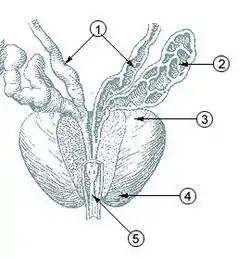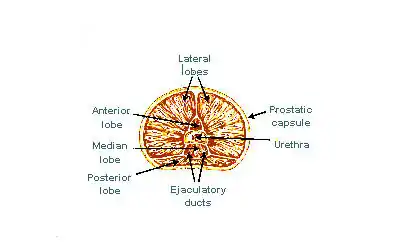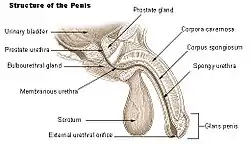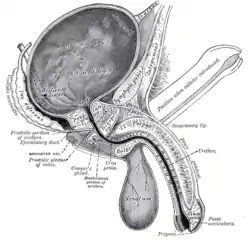| Prostatic urethra | |
|---|---|
 The male urethra laid open on its anterior (upper) surface. (Prostatic part labeled at upper right.) | |
 | |
| Details | |
| Identifiers | |
| Latin | pars prostatica urethrae |
| TA98 | A09.4.02.004 |
| TA2 | 3445 |
| FMA | 19673 |
| Anatomical terminology | |
The prostatic urethra, the widest and most dilatable part of the urethra canal, is about 3 cm long.
It runs almost vertically through the prostate from its base to its apex, lying nearer its anterior than its posterior surface; the form of the canal is spindle-shaped, being wider in the middle than at either extremity, and narrowest below, where it joins the membranous portion.
A transverse section of the canal as it lies in the prostate is horse-shoe-shaped, with the convexity directed forward.
The keyhole sign, in ultrasound, is associated with a dilated bladder and prostatic urethra.
Additional images
References
![]() This article incorporates text in the public domain from page 1234 of the 20th edition of Gray's Anatomy (1918)
This article incorporates text in the public domain from page 1234 of the 20th edition of Gray's Anatomy (1918)
External links
- Anatomy image: malepel2-4 at the College of Medicine at SUNY Upstate Medical University
- Cross section image: pelvis/pelvis-e12-15—Plastination Laboratory at the Medical University of Vienna
- Anatomy photo:44:05-0201 at the SUNY Downstate Medical Center - "The Male Pelvis: The Prostate Gland"
- Chronic Prostatitis - Four Major Symptoms and Three Lifestyle To Follow
This article is issued from Wikipedia. The text is licensed under Creative Commons - Attribution - Sharealike. Additional terms may apply for the media files.




